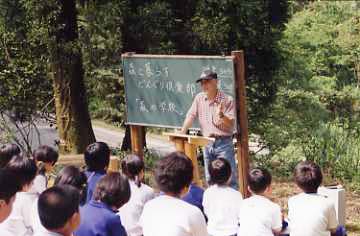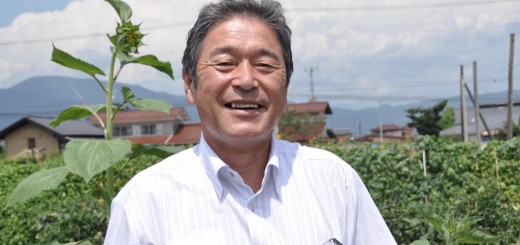Group Introduction Acorn Forestry Club Doing business while opposing nuclear power in a nuclear town Nuke Info Tokyo No. 104
By Teruyuki Matsushita*
 |
||
|
Teruyuki Matsushita teaching about the forest
|
There’s an unwritten law which says that if you live near a nuclear power plant, it’s hard to do business if you oppose nuclear power. But I don’t think it’s true. There are people who support nuclear power and there are people who oppose it. Other than people with a vested interest, by and large people who support nuclear power aren’t really interested in such issues. It’s the people who oppose nuclear power who have opinions of their own. If you provide good merchandise and good service, people will understand. And you can also bring in people from outside the region. With that in mind, we took on the challenge of forestry work.People tend to think of forestry work as growing and selling timber, typically cedar and cypress, but what we do is a bit different from that. We try to make the most of the bounty that the forest provides. Forests have all sorts of functions. We talk to people about the forest’s systems and functions and charge them good money to listen. We also act as forest guides. Vines are hated by most forestry workers, but if we run across an akebi vine while we are conducting a tour, we make a basket or a wreath out of it. When we make flower arrangements using the flowers that bloom all around us, people gasp with delight. We use the mountain plants in our cooking, we make handicrafts with the sticks and leaves and we also made a small campsite. There’s an outdoor bath and we collect the water and heat the bath ourselves. For people who know no other way to cook than with gas or electricity, it’s a fresh experience to use a wood fire. They find out what the phrase ‘smoke gets in your eyes’ really means. There’s also a barbecue. Our club is a very small system, but in order to help people get in touch with nature, we provide them with inconvenience. That’s the basic principle of the Acorn Forestry Club. We even went so far as to draft our own ‘management philosophy’. It may sound like an overstatement, but we get excited just reading it.
But the pressure to conform is very strong in rural communities in Japan. If you try to do something a bit different, you get beaten down. We started to build on our first site. We bought an excavator and got a license to operate it. We prepared the site by the sweat of our brows for half a year. It was fun. When we sat on the excavator, we wondered, “is there any work in the world more enjoyable than this?” But just as we reached the stage where we were ready to begin building our club house, someone found fault with the way we were going about it and came to ask us for a bribe. The old women who owned the land didn’t want us to give in. We tried to hold out for their sake, but in the end we had to abandon our original plan. The tears flowed freely when we told them that we were pulling out. We consulted a lawyer and confirmed that there was nothing wrong with what we were doing. Our reason for not proceeding was that we didn’t want to cause problems for our guests. On numerous occasions during the heat of summer these old women had brought us ice-creams. They said, “You will introduce this little village to the world. Nothing could make us more happy.” It was very painful for us that we couldn’t keep our promise.
We looked for another site and got started again at last. Our club moved into the spotlight. We got quite a bit of publicity from the TV and the newspapers and after three years, we started to make money. We are extremely proud of the fact that we took on the challenge of forestry work. Who was it that said, “You can’t do business in a nuclear town if you oppose nuclear power”? These days whatever we do is just such fun.
* Teruyuki Matsushita is Planning Coordinator of the Acorn Forestry Club, which is located near the Mihama Power Plant.

